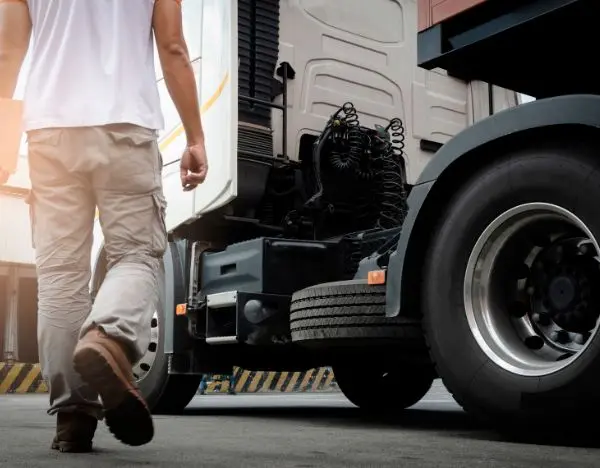CDL Overwieght Ticket Lawyer
At the Law Office of Craig Bondy, we understand the unique challenges and high stakes involved in commercial driving in New York. One of the most common and potentially serious issues faced by commercial drivers is receiving an overweight ticket. Overweight violations not only carry substantial fines but can also impact your CDL status, increase insurance rates, and affect your and your company’s reputation. Our CDL overweight ticket lawyers are experienced in defending commercial drivers and trucking companies against overweight ticket charges. Contact us today for immediate help.
What is a CDL Overweight Ticket?

A Commercial Driver’s License (CDL) overweight ticket is a type of traffic citation issued to drivers of commercial vehicles, such as trucks and tractor-trailers, when the weight of their vehicle (including cargo) exceeds the legal weight limits established by federal, state, or local regulations. These weight limits are put in place to protect roadways and infrastructure from damage that can be caused by excessively heavy vehicles, as well as to ensure safety on the roads.
Understanding Weight Limits
Weight limits can vary depending on the type of roads, bridges, or highways used. There are generally two key measurements:
- Gross Vehicle Weight Rating (GVWR): The maximum allowed weight of the vehicle plus its cargo, fuel, and passengers.
- Axle Weight: The weight limit for each axle of the vehicle. This is important because evenly distributing the vehicle’s weight across all axles can help avoid overweight violations.
How Overweight Tickets Are Issued
These limits are typically enforced at weigh stations or through portable weigh-in-motion devices. If a commercial vehicle is found to be over the limit, the operating driver can be issued an overweight ticket. In some jurisdictions, the severity of the violation and the associated fines may increase with the amount the vehicle is overweight.
When and Where Can Overweight Tickets Be Issued?
Overweight tickets can be issued to drivers of commercial vehicles whenever and wherever their vehicle’s weight exceeds the legal limits set by federal, state, or local authorities. These legal limits are established to prevent damage to roads and bridges and ensure safety. The enforcement of these weight regulations can happen in several contexts:
Weigh Stations
Weigh stations are the most common places where overweight tickets are issued. These are specialized checkpoints located along highways where commercial vehicles are required to stop and have their weight checked. If a vehicle is found to be overweight at a weigh station, the driver can be issued a ticket on the spot.
Roadside Checks
Law enforcement officers equipped with portable weigh scales can conduct random roadside checks of commercial vehicles. These checks can occur anywhere on public roads and are not limited to fixed weigh stations. If a vehicle is found to be overweight during such a check, the officer can issue an overweight ticket.
Special Enforcement Operations
Transportation and law enforcement agencies sometimes conduct targeted enforcement operations focusing on commercial vehicles and their compliance with weight regulations. These operations can take place in areas known for frequent overweight violations or as part of broader traffic safety campaigns. Overweight tickets can be issued during these operations.
Ports, Warehouses, and Distribution Centers
Although less common, overweight tickets can also be issued in or near ports, warehouses, and distribution centers, especially if a vehicle leaves such a facility and is immediately found to be in violation of weight limits by law enforcement.
Entry/Exit Points of Restricted Roads
Certain roads, bridges, or tunnels may have specific weight restrictions lower than general state or federal limits. Commercial vehicles might be checked for compliance upon entering or exiting such restricted areas. Overweight tickets can be issued at these points to vehicles that exceed these specific restrictions.
Construction Zones
In some cases, temporary weight limits might be imposed in construction zones to protect the integrity of unfinished roadways or structures. Overweight tickets can be issued to vehicles violating these temporary restrictions.
Timing
Overweight tickets can be issued at any time—day or night—whenever enforcement officers are conducting weigh-ins or checks. Some states may increase the frequency of these checks during periods of heavy commercial traffic or as part of periodic enforcement blitzes.
The issuance of an overweight ticket not only results in immediate penalties but can also have long-term implications for the driver and the commercial entity they represent, including fines, points against the commercial driver’s license (CDL), and potential damage to professional reputation. It’s essential for commercial drivers and their employers to be diligent in adhering to weight regulations and to seek legal advice from a CDL overweight ticket lawyer if faced with an overweight ticket.
What Factors Determine Weight Limits?
The determination of weight limits for vehicles, especially commercial ones, involves several key factors designed to ensure safety, protect infrastructure, and facilitate efficient transportation. Understanding these factors can help drivers and transportation companies comply with regulations and avoid penalties such as overweight tickets. Here’s a breakdown of the main factors that determine weight limits:
Road and Bridge Design
One of the primary considerations in setting weight limits is the design and condition of the roads and bridges. Engineers design these structures with specific load-bearing capacities, taking into account the materials used in construction, the intended lifespan, and safety margins. Weight limits help to prevent damage to these structures, ensuring they remain safe and serviceable for all users.
Safety
Vehicle weight directly impacts braking distance, control, and stability. Heavier vehicles require more time and distance to stop, have a higher center of gravity, and are more challenging to control, especially in emergency situations. Setting weight limits is crucial for minimizing the risk of accidents caused by these factors.
Environmental Considerations
Heavy vehicles exert more pressure on the road surface, leading to more significant wear and tear, including potholes, ruts, and cracks. Over time, this can degrade road quality and lead to increased maintenance and repair costs. Weight limits help to mitigate these environmental impacts.
Traffic Flow and Congestion
In areas with high traffic volumes, weight limits can also be influenced by considerations of traffic flow and congestion. Heavier vehicles can slow down traffic, especially on inclines or in areas where frequent stopping and starting are required. By regulating vehicle weights, traffic authorities aim to maintain smoother traffic flow and reduce congestion.
Legal and Regulatory Frameworks
Weight limits are also determined by legal and regulatory frameworks set at the federal, state, and local levels. In the United States, for example, the Federal Highway Administration (FHWA) establishes maximum weight limits for Interstate highways, while states can set their own limits for roads and highways not covered by federal regulations. Local jurisdictions may impose additional restrictions based on specific local conditions or infrastructure concerns.
Type of Cargo
Certain types of cargo may be subject to specific regulations that influence weight limits. For example, hazardous materials might have stricter weight restrictions due to the increased risk they pose. Similarly, perishable goods might be allowed higher weight limits under certain conditions to facilitate quick transportation.
Vehicle Type and Configuration
The type of vehicle and its configuration (e.g., number of axles, spacing between axles, tire size) also play a significant role in determining weight limits. Generally, more axles can distribute the vehicle’s weight more evenly, potentially allowing for higher weight limits. Regulations often specify maximum weight limits per axle to prevent undue stress on road surfaces and structures.
Understanding and adhering to the weight limits is crucial for all drivers, especially those operating commercial vehicles, to ensure safety, protect infrastructure, and avoid legal issues such as overweight tickets. For drivers facing challenges related to weight limit regulations, seeking legal advice from a CDL overweight ticket lawyer can be a valuable step in navigating these complexities.
Why Are Weight Limits Enforced in NYC?
Enforcing weight limits on vehicles, especially commercial ones, is crucial for a densely populated and heavily trafficked area like New York City (NYC). The city’s unique infrastructure, safety concerns, and environmental considerations all play a role in why these regulations are strictly applied. Here’s how these factors come into play in NYC:
- Protection of Infrastructure: Prevents damage to roads, bridges, and tunnels, extending their lifespan and ensuring safety.
- Safety Concerns: Mitigates risks associated with longer stopping distances and harder maneuverability of overweight vehicles, enhancing road safety for all.
- Environmental Impact: Reduces road wear and tear, decreasing the need for frequent repairs and associated environmental degradation from emissions.
- Traffic Flow and Congestion: Alleviates traffic congestion by ensuring smoother flow of traffic, as overweight vehicles can disrupt normal traffic patterns.
- Legal and Regulatory Compliance: Ensures adherence to state and federal vehicle weight regulations, avoiding legal penalties.
- Support for Fair Competition: Maintains a level playing field in the commercial transport sector by preventing companies from overloading vehicles to gain unfair advantages.
This approach helps maintain the integrity of NYC’s transport infrastructure and contributes to a safer, more sustainable urban environment.
How Does an Overweight Ticket Affect a CDL?
An overweight ticket can have several significant effects on a Commercial Driver’s License (CDL) holder, impacting their professional standing, financial situation, and legal status. Here are the key ways an overweight ticket can affect a CDL:
- Points on Driving Record: Depending on the state’s regulations, receiving an overweight ticket may result in points being added to the CDL holder’s driving record. Accumulating too many points can lead to further disciplinary actions, such as suspension of the CDL.
- Fines and Penalties: Overweight tickets often come with hefty fines, which can be especially burdensome for independent drivers or small business operators. In some cases, the fines are proportional to the amount by which the vehicle is overweight, meaning the penalty can be substantial.
- Increased Insurance Premiums: Having an overweight ticket on your record can lead to higher insurance premiums. Insurance companies may view drivers with violations as higher risk, which can significantly increase the cost of insurance for commercial drivers.
- Employment Consequences: Employers may view overweight tickets negatively, especially if they indicate a pattern of disregard for regulations. This can affect a driver’s current job status or future employment opportunities within the commercial driving industry.
- Risk of Suspension or Revocation: In severe cases or with multiple violations, there’s a risk of suspension or revocation of the CDL. Losing a CDL, even temporarily, can have a devastating impact on a commercial driver’s ability to work and earn a living.
- Reputation Damage: For commercial drivers, maintaining a clean driving record is crucial for reputation and reliability. An overweight ticket can tarnish a driver’s professional reputation, potentially affecting their relationship with current and future clients or employers.
- Operational Restrictions: In some instances, receiving an overweight ticket might lead to operational restrictions until the issue is resolved. This could mean delays and additional costs for drivers and their companies.
Given these potential impacts, it’s essential for CDL holders to take overweight tickets seriously and consider seeking legal assistance to mitigate the consequences. An experienced NYC traffic attorney can provide advice on challenging the ticket, negotiating penalties, or taking steps to minimize the effect on the CDL and the driver’s professional future.
How a CDL Overwight Ticket Lawyer Can Help
At the Law Office of Craig Bondy, we understand the unique pressures and challenges faced by commercial drivers. A single CDL ticket can have wide-ranging consequences, from hefty fines to the potential loss of your livelihood. Here’s how our experienced CDL ticket lawyers can assist you in navigating the complexities of traffic law and protecting your professional interests:
- Challenge the Ticket: Your CDL overweight ticket lawyer will assess the circumstances and evidence to potentially challenge and dismiss the ticket.
- Reduce Penalties: A CDL overweight ticket lawyer will also negotiate to lower fines or reduce charges, minimizing financial and points-related penalties.
- Prevent CDL Suspension: A NYC traffic lawyer will argue on your behalf to avoid suspension or revocation of your CDL, protecting your livelihood.
- Navigate Legal Proceedings: Your CDL overweight ticket lawyer will guide you through the legal process, ensuring proper representation in court or administrative hearings.
- Advise on Compliance: Offer advice on regulatory compliance to prevent future violations and maintain a clean driving record.
- Mitigate Insurance Impact: Work to prevent increases in insurance premiums resulting from the ticket.
- Protect Employment: Help maintain your professional reputation and employment status within the commercial driving industry.
Need Help with a CDL Overweight Ticket? We’ve Got You Covered.
Facing an overweight ticket can be daunting for any CDL holder. The potential impact on your license, livelihood, and future can’t be understated. But you don’t have to face it alone. At the Law Office of Craig Bondy, our CDL overweight ticket lawyers assist commercial drivers against overweight tickets and other traffic-related charges. With our experience, you can:
- Challenge the Ticket: We’ll examine the circumstances of your ticket and explore all avenues for challenging it.
- Minimize Penalties: Our CDL overweight ticket lawyers goal is to reduce fines and prevent points from affecting your CDL.
- Protect Your Career: We understand the importance of your CDL and will do everything in our power to protect it.
Don’t let an overweight ticket weigh down your career. Contact us today for a consultation and take the first step towards clearing your record.
CDL Overweight Ticket Lawyer FAQs
What is a CDL overweight ticket?
A CDL overweight ticket is issued to commercial drivers whose vehicles exceed the legal weight limits set by federal, state, or local regulations. These tickets are serious violations that can affect a driver’s CDL status and livelihood.
How can a CDL overweight ticket lawyer help with an overweight ticket?
- Challenging the Ticket: Evaluating the ticket’s validity and challenging inaccuracies.
- Negotiating Penalties: Working to reduce fines and prevent points from being added to your CDL.
- Legal Guidance: Offering expert advice on navigating the legal system and minimizing the ticket’s impact.
Is it worth fighting a ticket with a CDL overweight ticket lawyer?
Yes. Given the potential penalties and long-term impact on your career, challenging an overweight ticket with the help of a skilled lawyer can be beneficial. A CDL overweight ticket lawyer can identify defenses you might not be aware of and help mitigate the consequences.
What should I do if I receive an overweight ticket?
- Do not admit guilt or pay the ticket without consulting a lawyer.
- Gather all relevant information, including the ticket, vehicle weight records, and any related documentation.
- Contact a CDL overweight ticket lawyer to discuss your case and explore your options.
Can a CDL overweight ticket lawyer guarantee that my ticket will be dismissed?
No lawyer can guarantee a specific outcome in any legal matter. However, an experienced CDL overweight ticket lawyer can significantly improve your chances of a favorable result by using their knowledge and expertise to challenge the ticket or negotiate the penalties.
Call 212-257-8321 to receive a free, no-obligation ticket evaluation from The Law Office of Craig Bondy or reach us by email.
Contact Our team Today
Fields marked with an * are required
"*" indicates required fields
Contact Our Firm
The Law Office of
Craig Bondy
225 Broadway, Room 850
New York, NY 10007
phone: 212-257-8321











